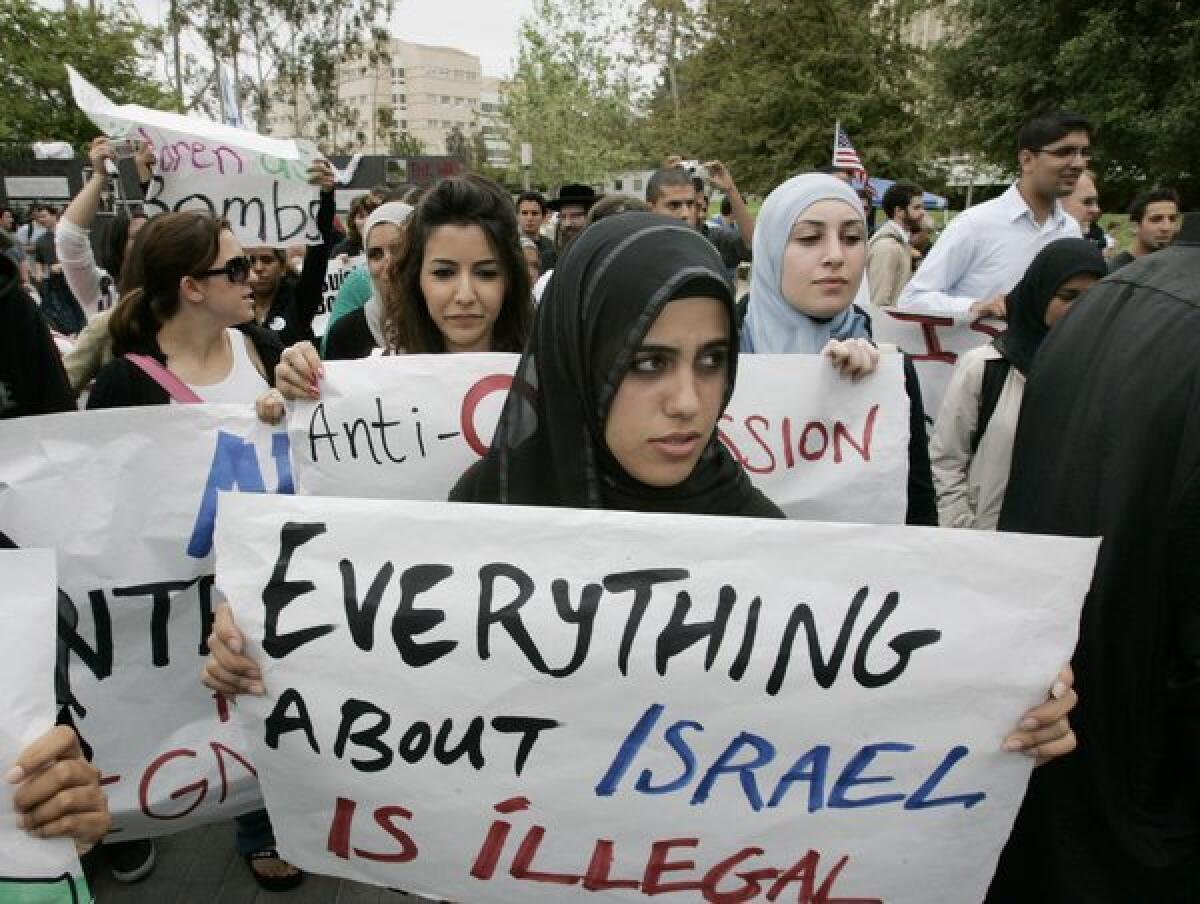Two more UC campuses cleared in U.S. probes of anti-Semitism

- Share via
The U.S. Department of Education has exonerated two more UC campuses -- Irvine and Santa Cruz -- of allegations that they fostered anti-Semitic climates by allowing protests against Israeli policies and other incidents that Jewish students contended amounted to illegal harrassment.
UC Berkeley announced Tuesday similar findings that ended an investigation by the federal department’s Office for Civil Rights into complaints by Jewish students. Related probes at UC Irvine and UC Santa Cruz also are completed with findings that the schools are not at fault, officials said Wednesday.
The investigations, while looking at various incidents between 2007 and 2012, generally dealt with the contentions that campus protests against Israel’s treatment of Palestinians stepped over the line into such strong anti-Semitism that some Jewish students felt fearful on campuses.
The federal reports found that some of the protests and other confrontations may have been offensive but were permissible as free speech or were not harsh or persistent enough to threaten Jewish students’ educations and safety.
For example, at an anti-Israel protest at UC Irvine in 2007, Jewish students said they heard a demonstrator curse a rabbi and make what they contended was an anti-Semitic remark to him.
“Although offensive, this statement is not sufficiently serious as to deny or limit students’ ability to participate in or benefit from the University’s program,” investigators wrote in a letter to the university.
UC Santa Cruz lecturer Tammi Rossman-Benjamin, who was among those whose complaints triggered the investigations, said Wednesday that the three rulings did not take the issues seriously enough and that she planned to appeal the Santa Cruz one.
Taken together, the three decisions, she said, are “extraordinarily disturbing news that sends a horrible message to Jewish students that their concerns and fears are not going to be addressed, that anti-Semitic bigotry is not as imporant as racist bigotry.”
Rabbi Aron Hier, director of campus outreach for the Simon Wisenthal Center, issued a statement of disappointment that the education department “has failed to address the concerns of American Jewish families, many of whose children have been subject to intimidation, physical and verbal abuse because of their Jewish identity and support for the State of Israel.”
However, UC Santa Cruz Chancellor George Blumenthal, in a statement, said: “This campus values the free and open expression of ideas, and we diligently safeguard our students’ civil rights. We are, therefore, pleased that these allegations have been thoroughly investigated and dismissed.”
The issues have been particularly controversial at UC Irvine. A previous federal probe of alleged anti-Semitism at that school led to a similar exoneration in 2007. Three years later, Muslim students interrupted a campus speech by Israel’s ambassador to the U.S., triggering a controversy that led to 10 of them convicted of misdemeanor criminal charges; they are appealing. Those Muslim students also faced campus sanctions.
UC Irvine Chancellor Michael Drake said in a statement that “UC Irvine’s Jewish student community is vibrant, growing, and actively engaged in a wide variety of activities on our diverse campus. We are pleased that these allegations have been dismissed and believe very strongly in our carefully and actively nurtured culture of inclusion.”
Officials at the U.S. Department of Education did not respond to requests for an interview about why all three investigations were concluded at the same time. In a statement, the department’s Office for Civil Rights said anti-Israel demonstrations “did not constitute actionable harassment” that merited sanctions on the schools.
“In the university environment, exposure to such robust and discordant expressions, even when personally offensive and hurtful, is a circumstance that a reasonable student in higher education may experience,” the statement said.
Supporters of the pro-Palestinian demonstrators on campuses were pleased by the decisions, saying they were an affirmation of free speech rights and upheld their contention that many of the complaints were exaggerated.
Rebecca Pierce, a recent graduate of UC Santa Cruz and member of the Committee for Justice in Palestine, said in a statement that she and others felt “vindicated that the DOE has rejected this attack on our freedom of expression, and we will continue to advocate in accordance with our values regarding human rights and social justice.”
But activists involved in pro-Palestinian causes on campus also questioned why the probes took so long, with the one at Irvine started in April 2008, the Santa Cruz one in March 2011 and Berkeley, September 2012. Berkeley-based attorney Liz Jackson, who works with the Center for Constitutional Rights, said the delays have created a chilling effect, making some students afraid to participate in political actions. She said she deplored any anti-Semitic remarks made on campuses but that it is wrong to depict UC as having an anti-Jewish climate.
ALSO:
Los Angeles moves to lift decade-old ban on public murals
Hannah Anderson kidnap suspect’s sister: ‘Very difficult to believe’
Two women found dead in O.C. apartment, no visible signs of trauma
Twitter: @larrygordonlat